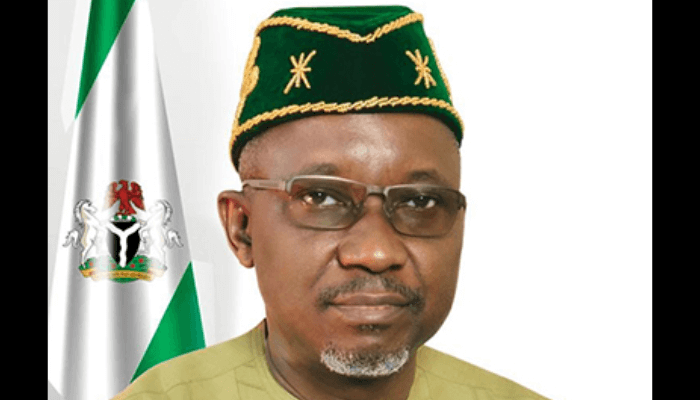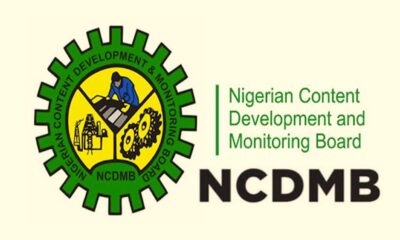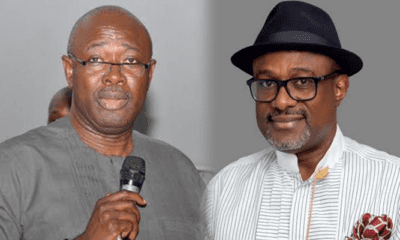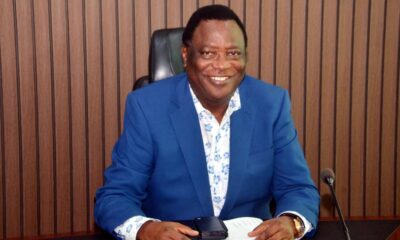Energy
NCDMB hosts oil industry players, academia

Oil and gas industry stakeholders and leading academics on Tuesday began a three-day Research and Development (R&D) Zonal Workshop at the Niger Delta University (NDU), Amassoma, with special focus on needs-driven research and deepening of collaboration and linkages, sponsored by the Nigerian Content Development and Monitoring Board (NCDMB).
The workshop provides a forum for discussions and demonstration of research breakthroughs on software and hardware as they relate to oil and gas industry needs, bioremediation and related oil field chemicals solutions, such as additives and drilling fluids, and renewable solutions to meet industry needs.
Scheduled to be hosted in the six geopolitical zones of the country by NCDMB Centres of Excellence in six universities, the workshop is also intended to enhance capacity building of research directors and lecturers, particularly in writing and reading compelling research proposals.
In a keynote address at the Workshop, the Executive Secretary of the NCDMB, Engr. Felix Omatsola Ogbe, said the Board is empowered by Sections 36-39 and 70 (m) of the Nigerian Oil and Gas Industry Content Development (NOGICD) Act, 2010, to “coordinate and superintend over research and development towards the further attainment of the goal of developing Nigerian content in the Nigerian oil and gas industry.”
According to him, “critical gaps hampering the research climate in our sector,” notably, “lack of research infrastructure, funding and weak commercial frameworks,” had been identified in the Board’s 10-Year Strategic Road Map, which had been developed in 2017. Appropriate measures to close such gaps were also identified.
He noted that “the establishment of Research Centres of Excellence in the six geopolitical zones of the country and establishment of the R&D Fund to stimulate research in the oil and gas sector” were some of the measures recommended to remedy the identified gaps. The Nigerian Content Research and Development Fund,” he explained, was launched by the Board in 2021 “with an initial seed capital of $50 million.”
Highlighting a major success in research-related endeavours of the NCDMB, Engr. Ogbe said the actualization of the commissioning of the Amal Technology Printed Circuit Board Manufacturing Facility in Abuja was a result of research commercialisation, “amplified in the NCDMB Technology Innovation and Incubation policy which created the Technology Innovation and Incubation Centre inside the Nigerian Content Towers at Yenagoa, Bayelsa State.
The Executive Secretary was represented by the Director of Planning, Research and Statistics, NCDMB, Mr Isaac Yalah, and he pointed out that the Board created six research centres of excellence hosted by tertiary institutions in different geopolitical zones.
These are Niger Delta University, which hosts a Centre of Excellence for Engineering Studies; Federal University of Technology (FUT), Akure; FUT, Owerri, and FUT, Minna, with Centres of Excellence in Geology and Geophysical Studies, Local Raw Materials Substitution, and Technology Development, Studies, respectively. Modibbo Adama University of Technology, Yola, hosts Safety and Environment Studies, while Usman Dan Fodio University, Sokoto, hosts Renewable Energy.
In setting the context of the event, NCDMB’s Director of Planning, Research and Statistics, Mr Isaac Yalah, described the Workshop as “a journey towards fostering collaboration and linkage between industry, academia and government,” which he noted are critical to the nation’s quest for economic development.
He said it is important to address the challenge, “How do we bring industry experts to enhance learning in universities?” noting that training and manpower development would be greatly boosted through such an approach. He recalled his own experience in South Korea in the past, where he observed that students in tertiary institutions were focused on solving industry problems.
According to him, with such an orientation, “Together, we [industry, academia and government] can unlock new frontiers of development.”
In Welcome Remarks, the Vice Chancellor, NDU, Professor Allen Aziba-Odumosu Agih, represented by the Deputy Vice Chancellor (Administration), Professor Jonah Akekere, expressed the joy of the institution’s Management in playing host to participants, while commending the NCDMB for its initiatives in human capital development.
He said the University greatly appreciates the Centre of Excellence status it enjoys as well as the partnership that has been fostered by the Board over the years. He cited computers donated to the university by the NCDMB to aid Information and Communication Technology (ICT) and digital penetration in the university community and its environs.
In a charge to all stakeholders, Professor Akekere declared: “Let the output of resource persons [at the Workshop] be sold to industry.”
Earlier in a programme overview, the Managing Director, Wider Perspectives Ltd., facilitators of the event, Mrs. Edughom Hanson, said interactions between oil and gas industry players, academics and policy-makers are vital for the successes the country seeks in national development.
She noted that, among other objectives, the Workshop seeks to build the capacity of research directors and lecturers in writing and reading compelling research proposals. “There are a lot of opportunities, a lot of grants that can be accessed out there for research purposes,” she stated, adding, “But the way you write the proposals matter.”
Presentations at the Technical Sessions include “Innovation on Software Development: Success Factors, Constraints and Look Ahead”; “Innovation on Hardware Development: Success Factors, Constraints, and Look Ahead”; “Innovations on Oil Field Chemical Development: Success Factors, Constraints, and Look Ahead,” and “Available Funding on Research and Development: Impact and Accessibility.”
Resource persons are Mr ThankGod Egbe, Managing Director, CypherCrescent, Dr Keluo Chukwuogu, Founder/CEO, Boskel Nigeria Ltd.; Jonathan Amarachi Njoku, Manager, Planning, Research and Statistics, NCDMB; Professor Joel Ogbonna, Commissioner for Petroleum Resources, Abia State; Mr Pacqueens Irabor, Manager South, Bank of Industry; Professor Yelebe Zekieni Robert, Director, NCDMB Centre of Excellence, NDU; Silas Omomehin Ajimijaye, General Manager, Research, Statistics & Development, NCDMB, and Professor (Mrs) Iheoma M. Adekunle, Director, Consultancy and Institutional Advancement, Federal University, Otuoke.
Energy
We need consultation, public hearing to review PIA regulations – NMDPRA


The Nigerian Midstream and Downstream Petroleum Regulation Authority (NMDPRA) says consultation with stakeholders and public hearing must be conducted to review proposed draft regulations of the Petroleum Industry Act (PIA).
The Authority’s Chief Executive, NMDPRA, Mr Farouk Ahmed, said this on Tuesday in Abuja at its stakeholder’s forum on Midstream Petroleum Host Community Development Trust (MPHCDT) regulation.
Ahmed, represented by Mr Ogbugo Ukoha, Executive Director, Distribution Systems, Storage and Retailing Infrastructure, NMDPRA, said consultation was necessary to provide a platform for harnessing ideas for the HCDT implementation.
“The regulation shall apply only to the Midstream Petroleum Host Communities and a holder of a license that is engaged in the midstream petroleum operation in accordance with Section 318 of the PIA.
“This is a platform for us to deliberate and get feedback on the draft regulations that we publish,” he said.
In an overview, Dr Joseph Tolorunse, the Authority’s Secretary and Legal Adviser, said the NMDPRA may by notice designate the facilities to which these regulations shall apply in accordance with the PIA.
He listed the objectives of the regulations to include the procedure for the establishment and administration of the Trust Fund for the midstream petroleum host communities and to establish parameters to safeguard the Trust Fund.
According to him, the regulation would also establish grievance resolution mechanism for the settlement of disputes between the host communities and licensees.
“The regulation will make general rules for the implementation of the development of the midstream petroleum host communities. It is expected to promote social and economic benefits from petroleum operations to the host communities.
“It will enhance peaceful and harmonious co-existence between the licensees, lessees and the host communities, as well as curtail pipeline vandalism and increase oil production,” he said.
Also speaking, Chairman, House Committee on Host Communities, Dounamene Dekor, said the committee had carried out a series of engagements to understand the current status of implementation of benefits to host communities.
He urged the Authority to expedite action to apply proactive and innovative mechanisms that would ensure the speedy and effective operationalisation of funding of host communities in the sector.
“We have noted some of the challenges that the authorities face in the implementation of the PIA, particularly the omission of the mainstream petroleum operations in Section 240-2 that provides for the funding of HCPs.
“Our committee is ready and already taking necessary legislative steps to address these gaps and challenges,” he assured.
Energy
Ekpo highlights pivotal role of LPG in industrialisation, job creation


Minister of State Petroleum Resources (Gas), Rt. Hon. Ekperikpe Ekpo, has emphasised the strategic importance of investment in the gas sector, saying it was pivotal for driving industrialization, job creation and improvement of the livelihood of the generality of Nigerians.
The Minister stated this at the groundbreaking ceremony of Windek Energy Limited 20,000 Metric Tonnes (MT) Liquefied Petroleum Gas (LPG) depot project at Atabrikang, Aquaha in Ibeno Local Government Area, Akwa Ibom State at the weekend.
He lauded the vision and commitment of Windek Energy Limited in Nigeria’s journey towards energy security and economic prosperity.
A statement by the Spokesman to the Minister, Louis Ibah, which quoted Ekpo, said the project would boost ongoing efforts in ensuring affordable supply of LPG, commonly known as cooking gas, to Nigerians.
“This project marks a significant milestone in Nigeria’s journey towards energy security and economic prosperity. It will enhance access to clean and affordable cooking fuel,” the Minister said.
Ekpo thanked the Akwa Ibom State government for providing the enabling environment for investments to thrive.
He underscored the fact that the establishment of the LPG depot was a testament to the fruitful collaboration between the public and private sectors in the state.
The Gas Minister said the LPG depot project holds immense promises, not only for Akwa Ibom people, but for the entire nation.
Akwa Ibom State Governor, Pastor Umo Eno, in his speech thanked the Minister of State Petroleum Resources Gas, Ekperikpe Ekpo, for facilitating the establishment of the gas plant in the state.
Eno, represented by the Deputy Governor, Senator Akon Eyakenyi, also assured Ekpo and the management of Windek Energy Limited of the security of contractors and staff, as well as the support and collaboration of the host community in bringing the project to fruition.
MD/CEO, Windek Energy Limited, Mrs. Nosa Okunbor, said the project holds the prospect of stimulating economic growth, fostering innovation, and facilitating the emergence of new industries and value chains within Akwa Ibom State.
“This project is not just about enhancing energy infrastructure, but about enhancing life such that our mothers will cook without hazards to their health,” she said.
Energy
Nigeria to produce 4,000 metric tonnes of lithium per day – Shettima


Nigeria is poised to produce 4,000 tonnes of lithium per day, Vice-President Kashim Shettima, said on Monday in Abuja.
Declaring open a two-day roundtable on Sustainable Development of Nigeria’s Mining Sector, Shettima said President Bola Tinubu would soon inaugurate Nigeria‘s largest lithium factory capable of processing 4,000 metric tonnes of lithium per day.
He noted that the Minister of Solid Minerals Development, Dr Dele Alake performed a ground-breaking ceremony for the Lithium factory in Nasarawa in 2023 to produce 18,000 metric tonnes of lithium per day.
Shettima said that more lithium sites were being discovered across the country.
Lithium is a soft, silvery-white alkali metal. It is the least dense solid element and is a critical solid mineral in the global energy transition.
It is currently mined in Nasarawa, Kogi, Kwara, Ekiti and Cross River states.
The vice-president commended Alake for the reforms he had brought to the solid minerals sector particularly his plan to sanitise and reposition the sector to boost Nigeria’s economic profile.
He also commended the Minister for making the sector public and private sectors-driven, adding that the approach would open up the sector for opportunities and fast-track its development.
Shettima was represented at the roundtable by Nasarawa’s Gov. Abdullahi Sule,
Speaking at the event, Alake said the ministry’s seven-point agenda was in line with President Tinubu’s commitment to diversify Nigeria’s economy.
He said that one of the ministry’s critical seven-point agenda was the emphasis placed on local value addition through policies that promoted the processing of raw minerals because of the economic multiplier effects.
He thanked the National Institute for Policy and Strategic Studies (NIPSS) Kuru, near Jos, for organising the summit.
Alake said the development of the solid minerals sector required collective responsibility by all stakeholders to make it a key contributor to the national economy.
He noted that the roundtable would enrich the analysis of the sector and its recommendations would guide the Executive arm of government in decision-making.
“NIPSS deserves commendation for prioritising the mining sector and in appreciating the strategic value the president placed on diversifying the nation’s economy,” he said.
Alake said also that a dual-pronged approach, combining coercive and persuasive methods, was employed to combat illegal mining and to attract foreign direct investment to the sector.
He explained that the persuasive measure entailed formalising artisanal and illegal miners into cooperatives and that 150 of such cooperatives had been registered so far.
The minister said the coercive method involved the establishment of a Mining Marshal Corps deployed across the country to secure mining environments.
He stressed the importance of geoscience data in providing investors with information on the location and quantity of minerals, among others, to help them to “de-risk” investments.
Alake said that a preliminary survey by a German company revealed an estimated 750 billion dollars’ worth of solid minerals in the belly of Nigeria.
Earlier, the Director-General of NIPSS, Prof. Ayo Omotayo, said the roundtable aimed at charting a way forward to deliver a diversified economy and to formulate policies to advance the mining sector.
NIPPS organised the roundtable in collaboration with a consulting firm.
-
capital market2 years ago
Rt.briscoe, FBNH, Others halts negative performance of stock market
-
Finance3 months ago
Court orders Sen. Victor Umeh to repay N136m bank debt to AMCON
-



 Abuja Update2 months ago
Abuja Update2 months agoUNDP, FG partnership needed to achieve inclusion, equity- Minister
-
Abuja Update1 month ago
Banks drive stock market performance with N147bn gain
-



 Business1 week ago
Business1 week agoTingo Group unveils Tingo Electric, Tingo Cola drink at Lagos launch
-



 Health2 weeks ago
Health2 weeks agoCapacity training will reduce migration of health workers- NPHCDA
-
News4 months ago
Oil thieves sponsoring malicious media campaign against Navy – Spokesman
-



 Infotech1 month ago
Infotech1 month agoWorld Backup Day: NITDA urges Nigerians to ensure backup of data










